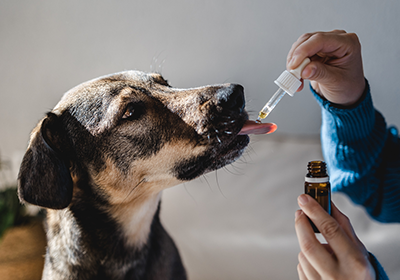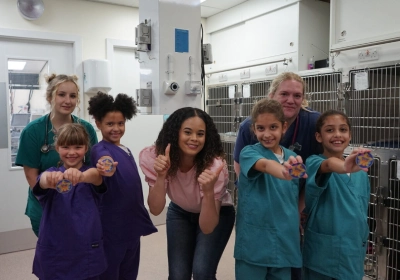Latest News from Abbey House Veterinary Hospital

- Details
CHANGES TO OUR SERVICES DURING EASTER WEEKEND
Easter is almost here, and we'd like to remind you that our opening hours over the Bank Holiday weekend may differ from our usual availability.

- Details
Easter is an indulgent time of the year, and whilst chocolate is a fond treat for us, it can have serious outcomes for dogs if they eat it. As a devoted pet owner, we know how important it is for you to be informed about potential dangers that our furry friends may face. At Abbey House Veterinary Hospital we share our valuable insights in this article, and guidance about chocolate and the affects it can have on your dog.

- Details
Inquisitive dogs and curious cats might enjoy investigating around the house, but the last thing you want them to do is harm themselves on household items.

- Details
Happy World Book Day to our wonderful clients at Abbey House Veterinary Hospital. Join us as we celebrate our favourite fictional pets. In this article we also explore how we can all take the lessons that we learn from our beloved fictional pets into our everyday lives. Whether you are a fan of the classics such as Wilbur the pig and Stuart Little, or a lover of Bluey and the Australian Heeler family, there is a fictional animal dear to all of us.

- Details
We understand that getting your furry friend to take their medication can sometimes feel like a challenge. Here we’ve compiled a handy guide to help make giving your pet medicine a much smoother experience for both of you.

- Details

- Details
Welcoming the New Year with resolutions for both you and your pets
As we step into a brand-new year, many of us will set new year resolutions to make positive changes in our lives. Why should this be any different for our family pets? Making resolutions for yourself and your pets can create healthy and happy habits and goals for the future. So, why not start the year with resolutions that cater to both you and your beloved pets?
At Abbey House Vets in Leeds, we are here to help you discover the significance of including your pet's needs in your resolutions and how these changes can boost your pet's mental and physical wellbeing.

- Details
We have been featured on a popular children’s TV series on Channel 5.

- Details
Essential research
There are many things to consider before you commit to a new pet and research is one of the best ways to prepare yourself. If you already have pets, then understanding how introducing a new pet could impact or affect your current animals is one important consideration. When choosing a pet, your decisions should be based on what best suits your lifestyle and living situation. Doing research on the different species and breeds will help you find a pet that matches your preferences and will teach you about their specific needs.

- Details
Caring for your senior pet
A dog or cat is considered senior after around 7 years of age, depending on the breed. Their needs may change as they get older, and you may need to care for them in different ways





